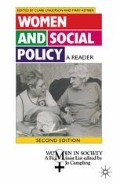Abstract
The highlighting of ‘carers’ as a social group sharing a common problem and a common interest was born out of feminist writing on the domestic labour of women. Caring for elderly people and other dependants was seen as an instance of unpaid work. Because of this, the dominant concern of the literature on care-giving has been the burden faced by women caring for frail elderly relatives (Biegel and Blum, 1990), rather than the preferences, needs and contributions of elderly people themselves. The focus of Equal Opportunities Commission research (EOC, 1980; 1982) and feminist writing (Finch and Groves, 1983; Dalley, 1988) has been on how caring responsibilities disadvantage women, with less attention devoted to gender inequalities among elderly people themselves. On both sides of the Atlantic, caring has been portrayed primarily as work done by daughters for parents (Land, 1978; Finch and Groves, 1980, 1982, 1983; Brody, 1981; Graham, 1983), while care by spouses or other relatives has received less attention (Parker, 1989). There has been little examination of the concept of caring, or questioning of the stereotype of ‘carers’ as middle-aged women.
Preview
Unable to display preview. Download preview PDF.
Editor information
Copyright information
© 1997 Macmillan Publishers Limited
About this chapter
Cite this chapter
Arber, S., Ginn, J. (1997). Informal Care-givers for Elderly People. In: Ungerson, C., Kember, M. (eds) Women and Social Policy. Women in Society. Palgrave, London. https://doi.org/10.1007/978-1-349-25908-3_26
Download citation
DOI: https://doi.org/10.1007/978-1-349-25908-3_26
Publisher Name: Palgrave, London
Print ISBN: 978-0-333-60187-7
Online ISBN: 978-1-349-25908-3
eBook Packages: Palgrave Social & Cultural Studies CollectionSocial Sciences (R0)

